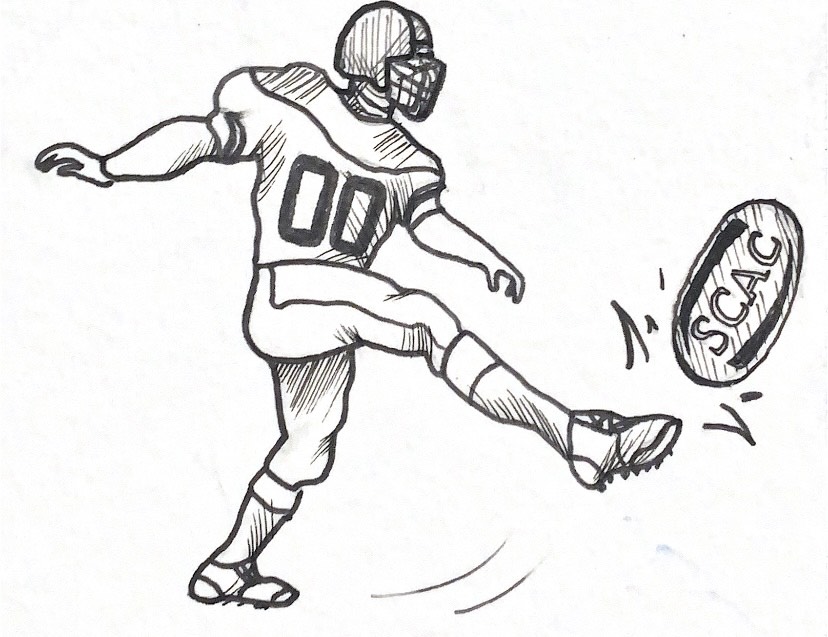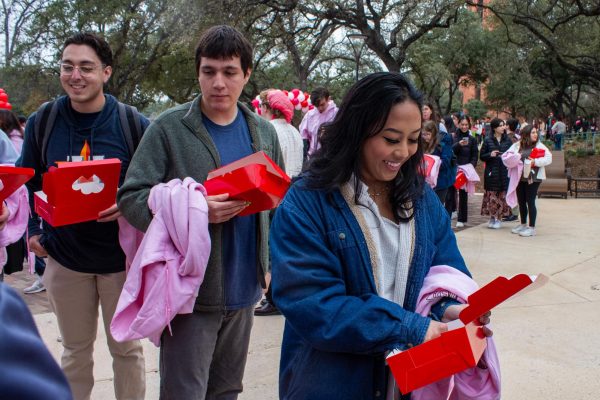Trinity says goodbye to the Southern Collegiate Athletic Conference
The athletic department sacks SCAC
This piece is entirely satirical. Read the rest of our April Fool’s edition, the Trinibonian, here https://trinitonian.com/category/special-sections/
The SCAC, better known as the Southern Collegiate Athletic Conference, is now a thing of the past for Trinity University. In a recent statement, Rob Queen, head of the former athletics department now renamed to the culinary arts department of Trinity, released a statement regarding the move from the SCAC to the Southern Appetite Association (SAA).
As for the reason why the athletics department is being moved to one of the culinary arts, Queen said he wishes for a change in the priority for students because sports had gained next to nothing for many of the students who partake in it, while cooking allows for life skills that will be beneficial in the future.
“Athletics have been an invaluable piece of our university’s in the past, however, inflation has driven maintenance costs to an all-time high, and the payback isn’t enough for the department or our students. As a result, we in the new culinary arts department wish to move to the SAA where a more useful skill set will be taught to our students while still retaining the team-building and competitive atmosphere we at Trinity are proud of,” Queen said.
SAA is known for pushing college students to perform in culinary competitions while still maintaining an academic background, much like the NCAA does for sports. However, unlike the NCAA, there is no judge or grading system. The SAA’s competitions circumvent the inherent subjectivity of taste by checking solely for adherence to certain criteria such as food cooked, thoroughness of meat preparation, presentation cleanliness, speed, use of time, etc. The SAA holds both individual and team competitions, in which competitors are required to cook a dish featuring a set of ingredients selected by the competition coordinators beforehand. As such, competitors are required to have both knowledge of individual ingredients’ quality as well as an understanding of which combinations of ingredients will yield the best results.
Before the official announcement by Queen, the debate on whether to change to the SAA or stay in the SCAC was tension-filled; the coaches and other staff of the Trinity Culinary team were split on the decision. Some such as Marc Pantry, head chef trainer, agreed that cooking provides a useful life skill while still maintaining the challenges and camaraderie found in athletics.
“Cooking is much like painting in the sense that different people may be given the same ingredients to cook, but the plate they produce can vary widely in quality and design. Put that into a competition format and you get both the challenge for students as well as a way to learn a practical skill set for their future,” Pantry said.
However, others such as Tim Scallion, the former head baseball coach who recently was redesignated the coach of cajun cuisine, had different opinions. Scallion notes that sports are much more complex than many point them out to be. Scallion also points out that for the staff, this could signal the end of their jobs as coaches.
“The idea that sports doesn’t teach anything worthwhile for our students is utterly ridiculous. Sports teach our students much more than just competitive spirit or getting in shape. It teaches athletes how to maintain a physique through discipline, as well as a means to interact with others outside of the activity without wasting food or foodstuffs which are already expensive as is,” Scallion said.
On the side of student-athletes, unlike their coaching staff counterparts, most student-athletes shared a general disdain for the switch. Many protested, fearing for the loss of their connections with teammates as well as fearing for their coaches whose futures seems to be in the air. Others, such as Jefferey Baker, sophomore computer science major, question what they are going to do without sports at Trinity.
“I came to Trinity because its sports teams were said to be one of the best for a school its size. In this team, I have made friends with whom I shared both moments of joy and sadness, and to now see it being ripped away while I’m not even halfway through my school life. I don’t know, this hurts more than anything,” Baker said.
With the school deciding to leave the SCAC, an agreement was reached to slowly build up to the SAA to ensure the teams are prepared for the future. Queen emphasized in his statement that while change will not happen instantly, students and staff should prepare for the SAA in any way they can.
“With time comes change. We understand the reason why some of our students and staff disapprove of our decision to switch, however, such change is necessary to ensure the best for our students’ futures,” Quiche said.

Whattup! My name is Skylar Savarin (she/her/hers), and I am the Visual section editor! I am a third-year double majoring in Human Communication and Art....









